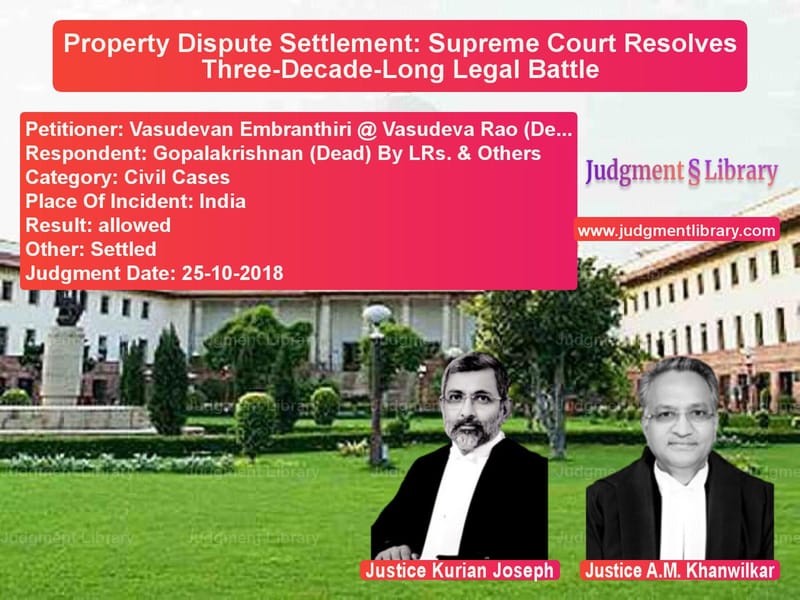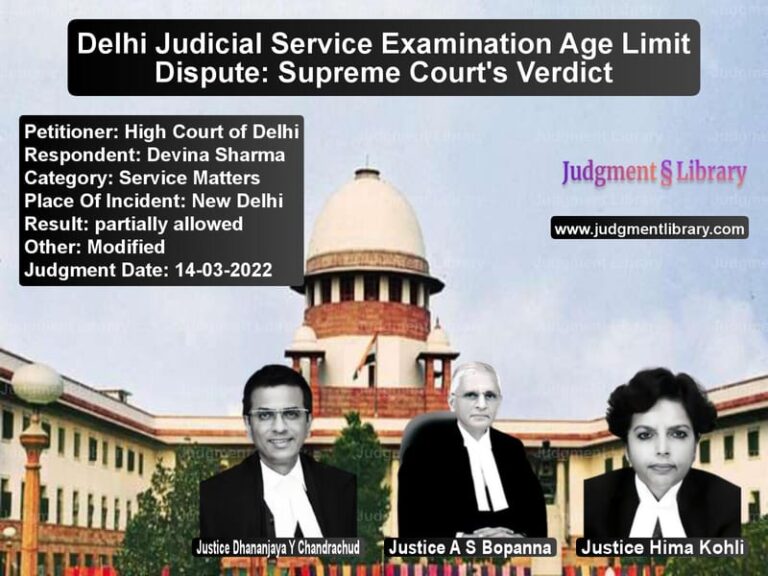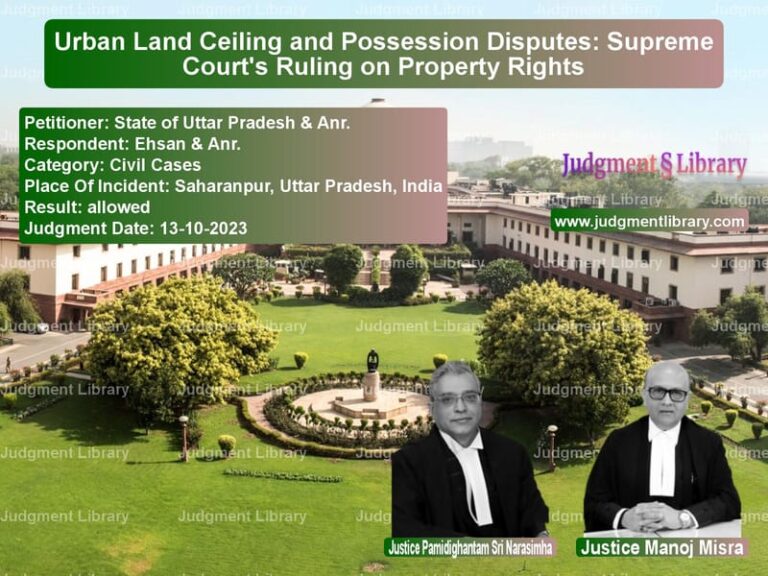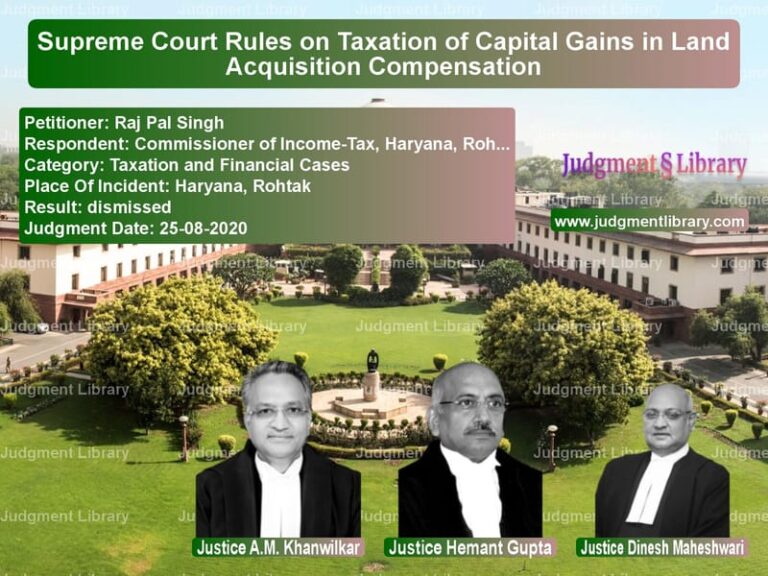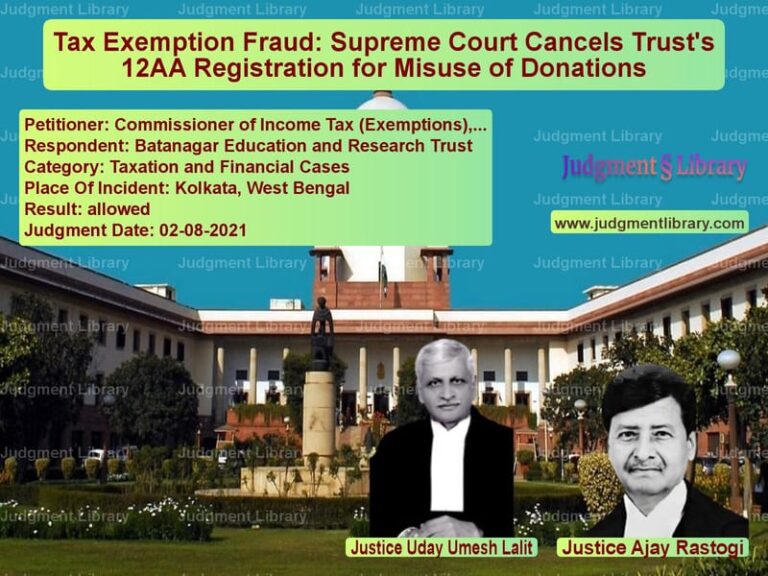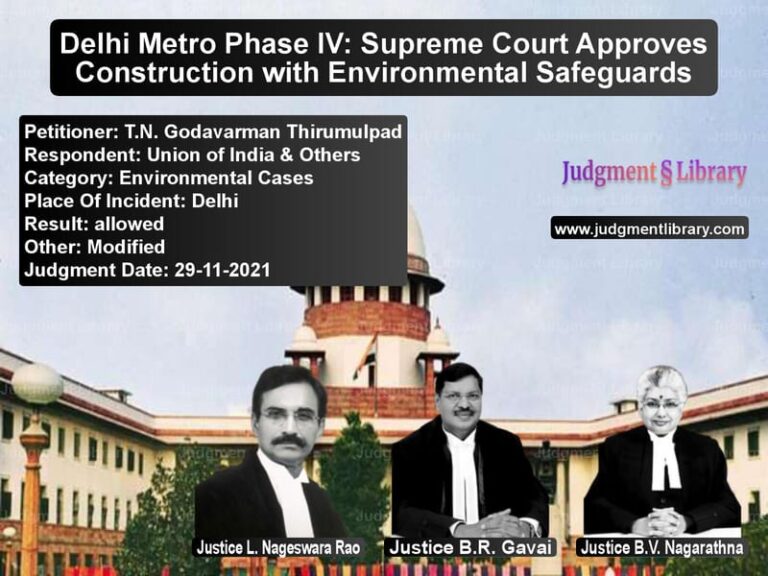Property Dispute Settlement: Supreme Court Resolves Three-Decade-Long Legal Battle
The case of Vasudevan Embranthiri @ Vasudeva Rao (Dead) By LRs. vs. Gopalakrishnan (Dead) By LRs. & Others marks the conclusion of a prolonged property dispute spanning over three decades. The legal battle, which began in 1984, involved the rightful administration and division of inherited properties. After several legal proceedings and failed settlement attempts, the Supreme Court invoked its extraordinary jurisdiction under Article 142 of the Constitution of India to bring an end to the dispute.
The case primarily revolved around an application for letters of administration, filed in 1984 by the first respondent, which was later converted into a suit. While the trial court dismissed the suit, the High Court overturned the decision, leading the legal representatives of the first defendant to approach the Supreme Court.
Background of the Case
The dispute originated from conflicting claims over the division and administration of inherited ancestral properties. The case saw multiple legal battles, failed settlement attempts, and intervention from family members who sought an amicable resolution.
Both parties presented settlement proposals, which included plans and sketches for the division of the disputed properties. However, due to minor disagreements, a mutual resolution could not be achieved. The Supreme Court, in its effort to provide a fair and conclusive decision, assessed the case’s entire history and all proposed plans.
Petitioner’s Arguments
The legal representatives of Vasudevan Embranthiri, the appellants, argued:
- The trial court had rightfully dismissed the respondent’s claim, and the High Court erred in reversing that decision.
- The property division proposed by the respondents was not equitable and did not reflect the rightful ownership shares.
- The Wills presented in evidence should have been upheld, as they defined the rightful distribution of the assets.
Respondent’s Arguments
The legal representatives of Gopalakrishnan, the respondents, countered:
- The property division should be carried out based on the latest legal findings and the plan proposed by their expert, Mr. C.K. Venu.
- The trial court failed to consider crucial aspects of the property ownership and the equitable division.
- The settlement plan proposed by them offered a fair and just division, which should be enforced.
Supreme Court’s Judgment
The Supreme Court, presided over by Justice Kurian Joseph and Justice A.M. Khanwilkar, took a decisive stance to put an end to the prolonged litigation. The Court ruled:
- “Looking at the facts of the case, it will be in the interest of all to put a quietus to the three-decade-long litigation.”
- “Having gone through the entire pleadings and having regard to the background of the case and for doing complete justice between the parties, we are of the view that it would be just, fair, reasonable, and equitable to have the properties divided in terms of the sketch prepared by Mr. C. K. Venu and as produced by the respondents.”
- “We make it clear that this Judgment is passed despite the vehement objections advanced by the appellants, for doing complete justice between the parties in exercise of our jurisdiction under Article 142 of the Constitution of India.”
- “The sketches of the plots prepared by Mr. C.K. Venu and the statement filed along with the sketches are taken on record. The same shall form part of the decree.”
- “This decree will be the source of title to the properties of the respective sharers.”
Key Takeaways from the Judgment
1. Invocation of Article 142
The Supreme Court exercised its extraordinary powers under Article 142 to ensure complete justice in the case. This provision allows the Court to pass orders that go beyond the statutory provisions to resolve disputes in a fair and just manner.
2. Supersession of Earlier Wills
The Court ruled that the two contested Wills (Exhibit A1 & B1) stood superseded by the decree. This decree itself would serve as the basis for property ownership, overriding any prior claims based on the Wills.
3. Judicial Finality
The ruling provided judicial finality to the case, ensuring that the property division outlined in the decree would be binding on all parties, preventing further litigation on the matter.
4. Role of Alternative Dispute Resolution
While settlement attempts had been made, the failure to reach a resolution demonstrated the importance of structured alternative dispute resolution mechanisms in complex inheritance and property disputes.
Impact of the Judgment
The ruling has significant implications for future inheritance disputes, particularly those involving prolonged litigation. It highlights the Supreme Court’s willingness to step in and impose a legally binding resolution when disputes remain unresolved for extended periods.
This case sets a precedent for:
- The use of Article 142 to expedite and finalize property disputes.
- The authority of the Supreme Court in superseding conflicting Wills to ensure equitable distribution.
- The importance of documented settlement plans in achieving legal finality.
The Court’s ruling ensures that the properties are now lawfully distributed as per the final decree, and the concerned Sub-Registrar was directed to update the official records accordingly.
Petitioner Name: Vasudevan Embranthiri @ Vasudeva Rao (Dead) By LRs..Respondent Name: Gopalakrishnan (Dead) By LRs. & Others.Judgment By: Justice Kurian Joseph, Justice A.M. Khanwilkar.Place Of Incident: India.Judgment Date: 25-10-2018.
Don’t miss out on the full details! Download the complete judgment in PDF format below and gain valuable insights instantly!
Download Judgment: Vasudevan Embranthir vs Gopalakrishnan (Dead Supreme Court of India Judgment Dated 25-10-2018.pdf
Direct Downlaod Judgment: Direct downlaod this Judgment
See all petitions in Property Disputes
See all petitions in Succession and Wills
See all petitions in Landlord-Tenant Disputes
See all petitions in Judgment by Kurian Joseph
See all petitions in Judgment by A M Khanwilkar
See all petitions in allowed
See all petitions in settled
See all petitions in supreme court of India judgments October 2018
See all petitions in 2018 judgments
See all posts in Civil Cases Category
See all allowed petitions in Civil Cases Category
See all Dismissed petitions in Civil Cases Category
See all partially allowed petitions in Civil Cases Category

